Key takeaways:
- Disability discrimination laws promote equal opportunities and require reasonable accommodations in the workplace, fostering a thriving environment for all employees.
- Current trends emphasize diversity and inclusion, with technology facilitating remote assessments to create accessible hiring processes for candidates with disabilities.
- Real-life cases of hiring discrimination highlight biases and misconceptions that can prevent companies from hiring exceptional talent, emphasizing the need for awareness and training.
- Strategies such as blind recruitment and open dialogue about accommodations can significantly combat discrimination and enhance inclusivity in hiring practices.
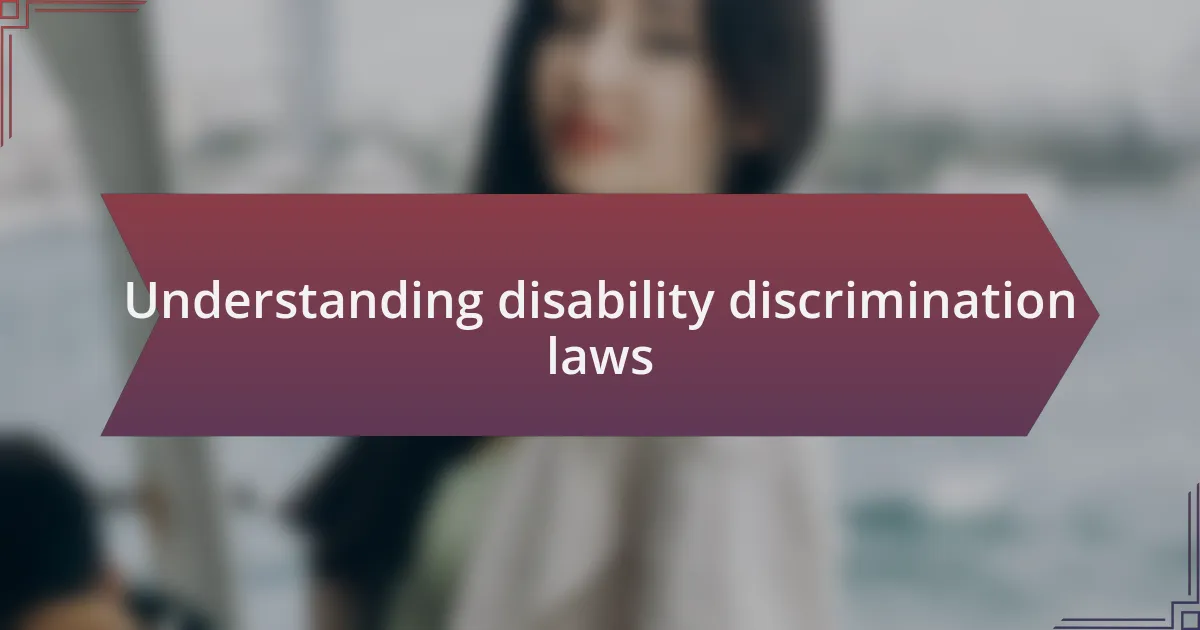
Understanding disability discrimination laws
Disability discrimination laws are designed to ensure that individuals with disabilities have equal opportunities in the workplace. From my experience, understanding these laws can feel overwhelming, but it’s crucial for both employers and employees to comprehend their rights and obligations. Have you ever thought about how inclusion goes beyond just being fair, but also fosters innovation?
One key aspect of these laws is the requirement for “reasonable accommodation.” This might mean adjusting work schedules or providing assistive technologies. I recall helping a friend navigate this process when she needed flexible hours due to a chronic condition. It reminded me that the goal isn’t just compliance, but creating an environment where everyone can thrive.
Furthermore, the Americans with Disabilities Act (ADA) plays a pivotal role in prohibiting discrimination in hiring practices. I’ve seen firsthand how the fear of misinterpreting these regulations can lead to missed opportunities—both for candidates and companies. Why should fear dictate potential? Clarity and awareness of the law can empower us to change the narrative around disability in the workplace.

Current trends in employment law
As I observe the evolving landscape of employment law, one trend that stands out is the increased emphasis on diversity and inclusion in hiring practices. Employers are not only recognizing the legal requirements but are also understanding the value of diverse perspectives, especially from candidates with disabilities. I remember attending a workshop where a company shared how hiring an individual with a disability transformed their team dynamics—how this person brought unique solutions to complex problems, proving that inclusion can drive business success.
Moreover, technology is reshaping the way we approach accessibility in recruitment. Tools that facilitate remote assessments and interviews are becoming mainstream, allowing candidates with disabilities to showcase their talents without facing the typical barriers of a traditional hiring process. Recently, I encountered a hiring manager who shared their relief in leveraging these technologies; they found that focusing on ability rather than disability opened up a wider talent pool and made their hiring more efficient.
Lastly, there’s a growing movement advocating for the enforcement of stricter penalties for non-compliance with disability discrimination laws. This trend reflects a societal shift, where holding employers accountable is seen as vital to fostering not just fairness, but genuine equity in the workplace. I often wonder, how many potential innovators are we sidelining simply because the systems in place aren’t accommodating? Recognizing the critical role of legal frameworks can inspire corporations to prioritize inclusivity at every level.
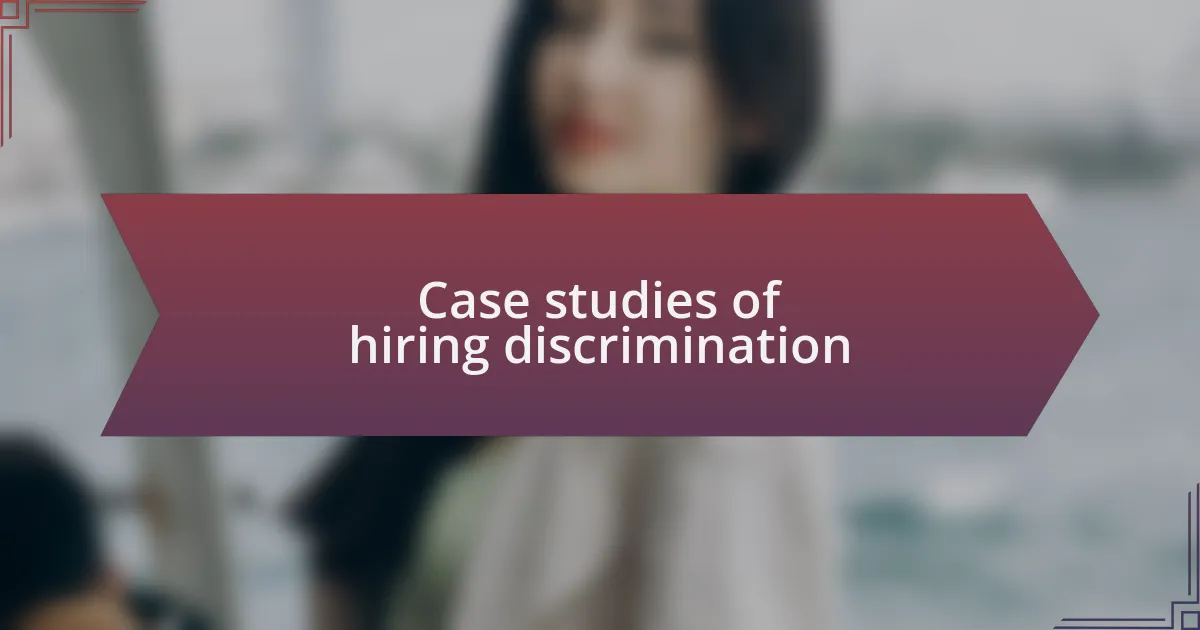
Case studies of hiring discrimination
There are numerous instances that reveal the harsh reality of hiring discrimination against individuals with disabilities. I recall a particular case involving a software company that interviewed a qualified candidate with a great track record but ultimately passed on hiring them. The reason given was that the candidate needed specific accommodations during the interview process. This raises an unsettling question: Are we truly measuring talent, or are we hesitating to invest in the necessary resources for inclusivity?
Another case that struck me involved a retail chain that allegedly overlooked a talented applicant who was deaf. The hiring team focused solely on the assumption that communication would be an issue, despite the candidate excelling in previous roles. This situation offers a sobering insight into the biases that often prevent companies from taking a chance on extraordinary candidates. How many brilliant minds are we losing because of misconceptions and unfounded fears?
Finally, I remember reading about a healthcare organization that faced legal action for denying an interview to a candidate in a wheelchair. Instead of acknowledging the candidate’s qualifications, they simply assumed their facility wasn’t equipped. This anecdote illustrates a disheartening reality: when employers don’t actively seek to dismantle barriers, they inadvertently create an impenetrable wall against diversity. What does this say about the values underpinning our hiring practices?
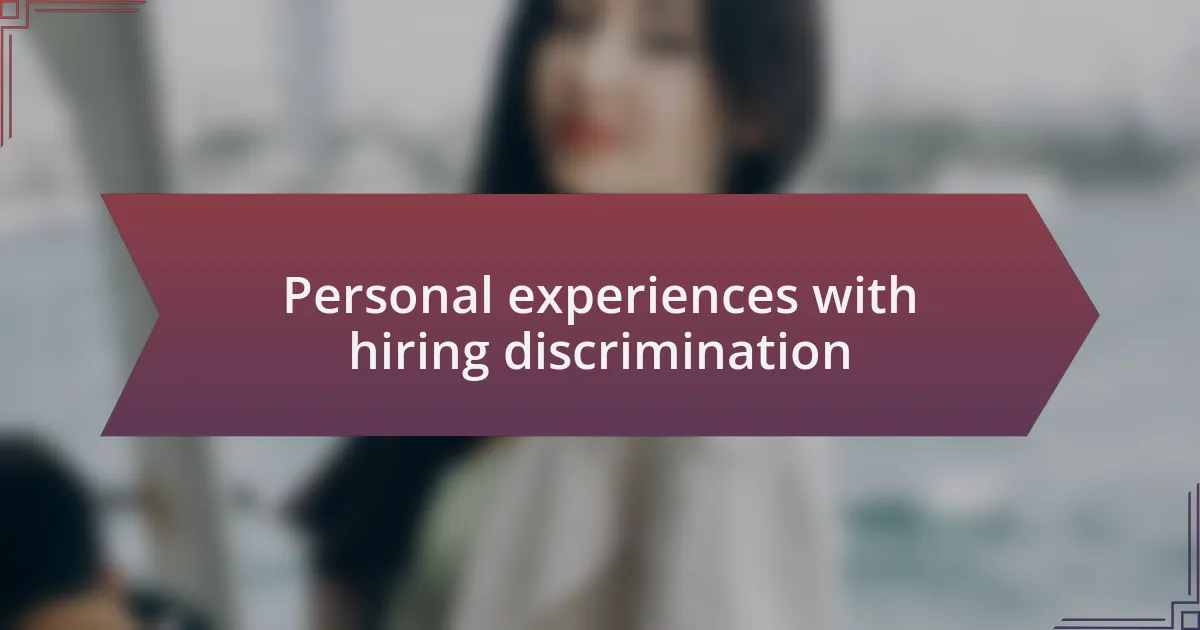
Personal experiences with hiring discrimination
Reflecting on my own encounters with hiring discrimination, I remember applying for a job I felt was perfect for me. I was enthusiastic, fully qualified, and ready to contribute, but when I mentioned needing a few accommodations during the hiring process, the conversation quickly shifted. It was evident that instead of focusing on my skills, the employer was fixated on my disability, leaving me wondering how many opportunities I might miss simply because of a lack of understanding.
In another instance, I attended a networking event where I met a bright individual with a visible disability. As we chatted, they shared their experience of being dismissed after revealing their condition during an interview. The hiring manager had been quick to state they preferred someone who could ‘fit the mold.’ It struck me how often biases masquerade as ‘fit,’ resulting in missed chances for both employers and candidates alike. Could these unexamined preconceptions be holding back the very innovation companies claim to pursue?
Even more jarring was a story I heard from a friend who applied for a dream job, only to be turned away without an interview. When they inquired further, they learned that the employer had simply assumed their expertise in accessible technologies was not a priority. Hearing this filled me with frustration. Why do some companies fail to recognize the unique perspectives that individuals with disabilities bring? Their decision not only denied a deserving candidate but also deprived their workplace of valuable insights.
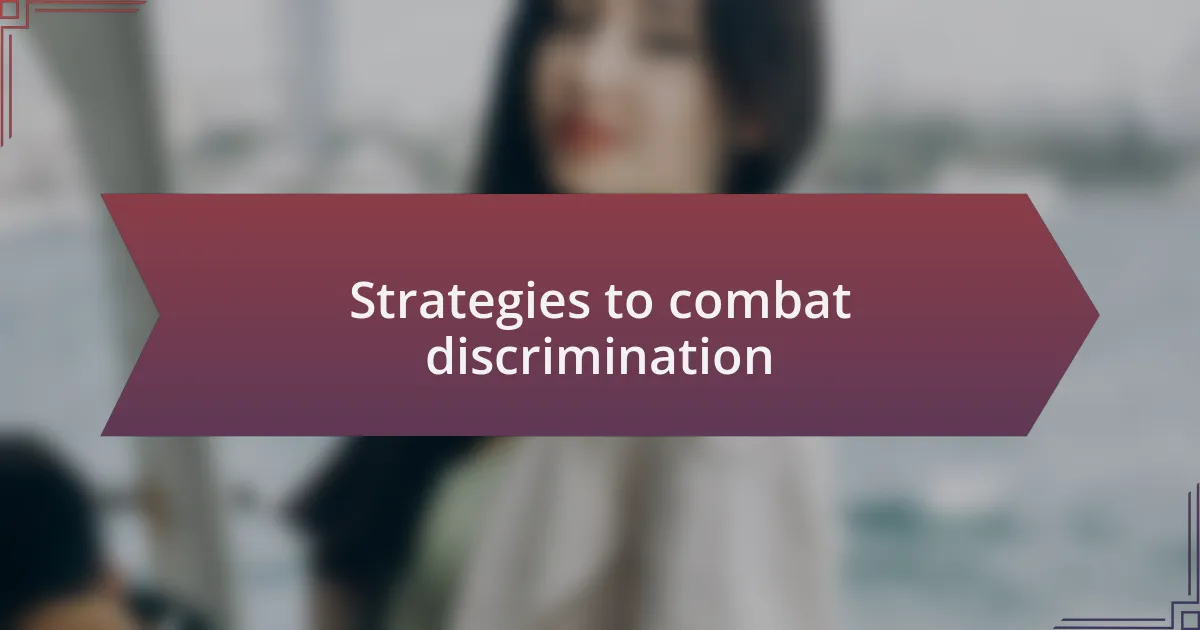
Strategies to combat discrimination
Understanding how to combat discrimination in hiring is essential for fostering inclusive workplaces. One effective strategy is providing training for hiring managers and human resources personnel on disability awareness. I recall a workshop I attended where a facilitator shared impactful stories from job seekers with disabilities. It left me inspired and motivated to advocate for change, illustrating how knowledge can challenge biases and preconceived notions.
Additionally, implementing clear policies that mandate the consideration of diversity and inclusion can shift company culture. In a previous job, our team implemented a blind recruitment process, which anonymized applicants’ identities during the initial screening. I witnessed firsthand how this approach expanded our candidate pool and led to hiring individuals whose talents we might have overlooked. Isn’t it compelling to think that simple adjustments to the hiring process can unlock a wealth of potential?
Lastly, encouraging open dialogue about accommodations during interviews can empower candidates to share their needs without fear of repercussion. During a panel discussion I attended, a panelist mentioned how transparency in communication broke down barriers. This concept resonated with me—imagine the transformational impact if more organizations prioritized dialogues about support over assumptions. Wouldn’t that change the landscape of hiring for the better?
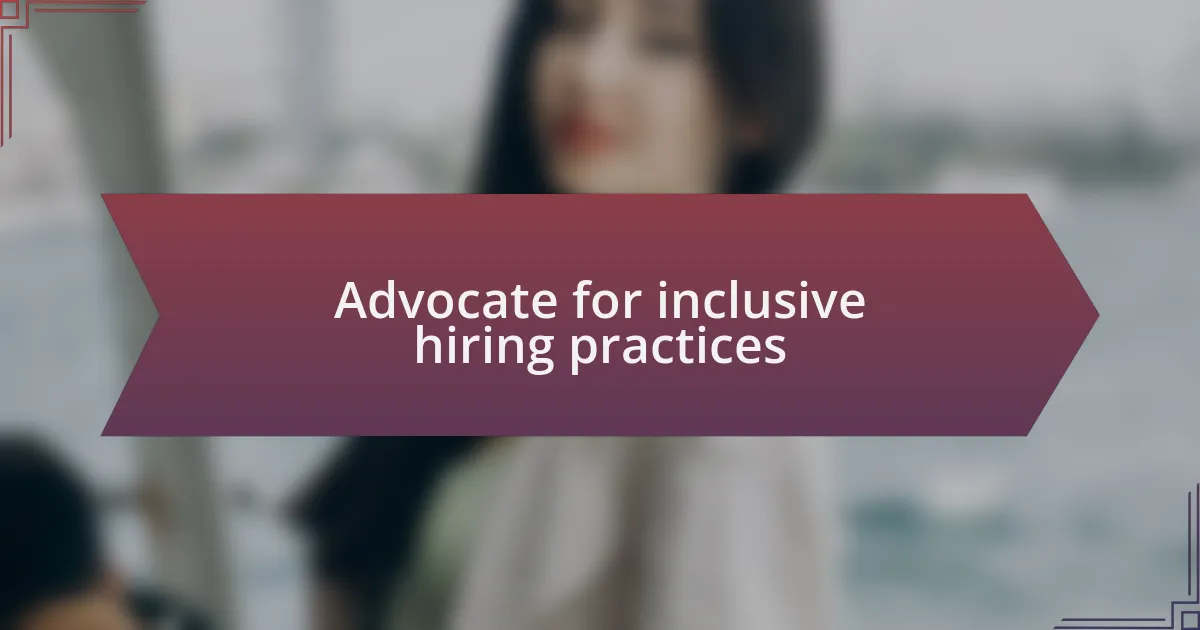
Advocate for inclusive hiring practices
Advocating for inclusive hiring practices means embracing a mindset that recognizes the value of diverse perspectives. I once interviewed a candidate who had a hearing impairment, and what struck me most was their determination and innovative problem-solving skills. I couldn’t help but wonder, how many invaluable contributions might we miss out on simply because we deny ourselves the chance to embrace diversity?
In my experience, creating an inclusive hiring framework involves actively seeking out and partnering with organizations that specialize in disability employment. I remember attending a networking event where I connected with a nonprofit focused on helping individuals with disabilities find meaningful work. The joy and pride on the faces of those who secured positions was a testament to the profound impact that a proactive approach can have. Isn’t it fascinating how building these bridges not only enhances a company’s talent pool but also enriches company culture?
Furthermore, I’ve seen organizations thrive when they publicly commit to inclusion. One company I worked with unveiled a campaign showcasing employees with disabilities in leadership roles, which profoundly changed perceptions both internally and externally. It made me realize that representation matters—when individuals see themselves reflected in an organization, they’re more likely to believe they belong. How powerful is that, to create an environment where every talent feels acknowledged and valued?